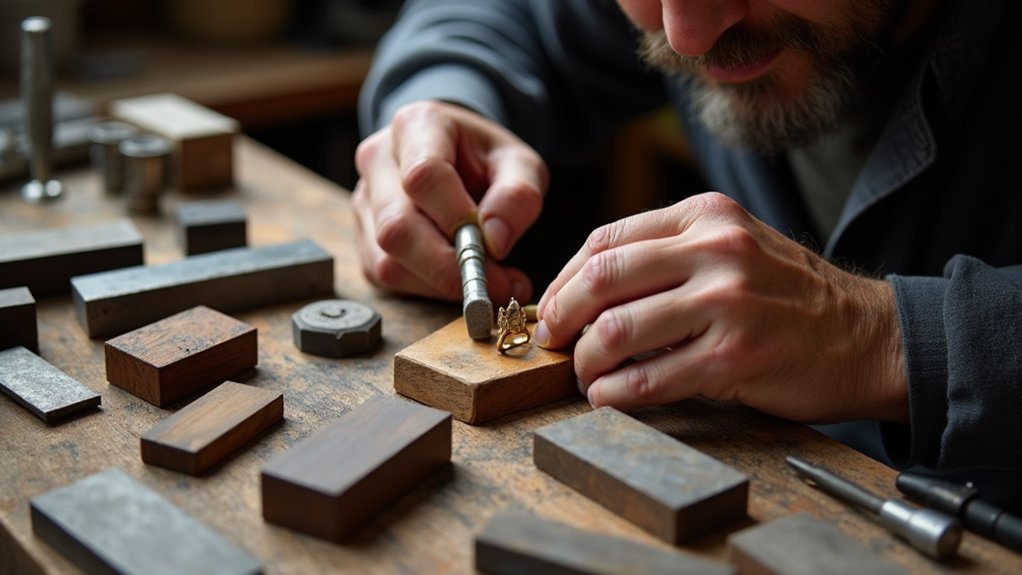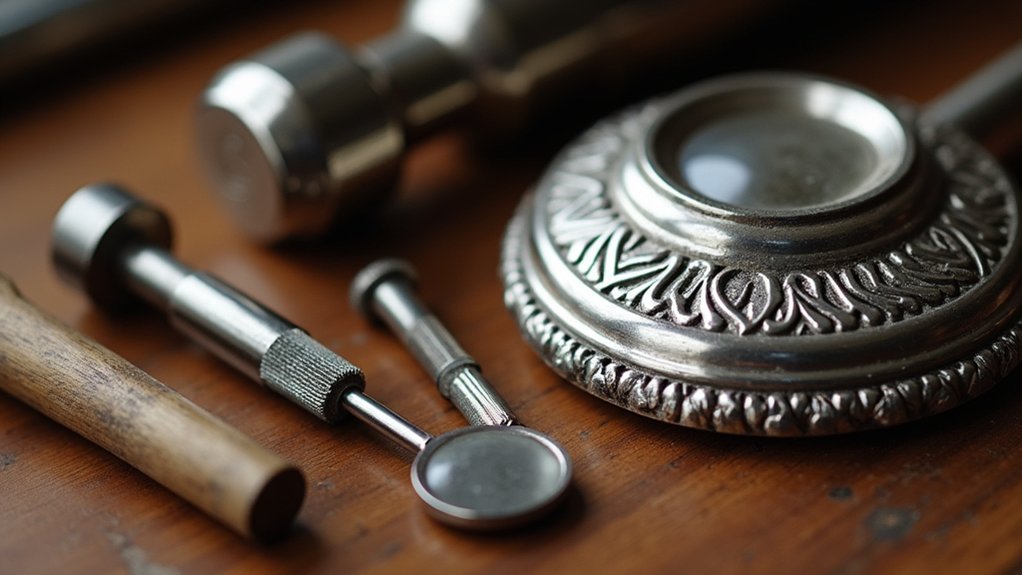You’ve set your sights on a jeweler’s bench block, but do you know which material will withstand years of hammering, stamping, and metalwork? In 2025’s crowded market, the difference between a block that lasts decades and one that deteriorates within months comes down to material choice. Steel dominates the top spots for durability, but is it right for every application? Let’s uncover which bench blocks truly deliver on their promises—and which ones simply don’t hold up.
The Beadsmith Steel Bench Block for Jewelry and Stamping (4 x 4 inches)
Crafters seeking professional-grade durability will find their match in The Beadsmith Steel Bench Block. This 4 x 4-inch solid steel workhorse weighs a substantial 3.25 pounds, preventing unwanted movement during stamping sessions.
You’ll appreciate its versatility for detailed stamping, wire shaping, and protecting work surfaces. With perfectly flat surfaces and precise 90-degree angles, it’s ideal for both jewelry making and leather projects.
The block’s scratch-resistant surface maintains its quality even after heavy use. While it arrives coated in protective oil that you’ll need to clean off, this small inconvenience pays off with rust prevention and longevity that’s earned it a 4.7-star rating.
Best For: Jewelry makers, metal stampers, and crafters requiring a heavy-duty, stable surface for detailed metalwork and stamping projects who need professional-grade durability without spending a fortune.
Pros:
- Heavy 3.25-pound solid steel construction prevents movement during stamping and hammering work
- Versatile 4×4-inch size accommodates various projects from small jewelry items to larger pieces like bangles
- Scratch-resistant surface with precise 90-degree angles maintains quality even after extensive use
Cons:
- Arrives coated in protective oil that requires thorough cleaning before first use
- Some users report quality control issues with damaged edges or manufacturing variations
- May be unnecessarily heavy for lightweight crafting projects or travel to crafting events
HimaPro Steel Bench Block 4×4 for Jewelry and Stamping
The HimaPro Steel Bench Block stands out as a workhorse for jewelers who need durability in a compact package. At 4×4×½ inches and weighing 2.39 pounds, it’s substantial enough for serious projects yet manageable for smaller workspaces.
The solid steel construction with hardened, polished surfaces makes it ideal for wire hardening and metal stamping. You’ll appreciate the chamfered edges that prevent injuries during intensive work sessions.
With a 4.7-star rating from nearly 1,200 customers, it’s proven reliable in real-world applications. Apply WD-40 occasionally to prevent rusting if you’re working in humid conditions.
Best For: Jewelry makers, metal stampers, and hobbyists who need a durable, compact working surface for shaping and hardening metals in small workshop spaces.
Pros:
- Solid steel construction with polished, chamfered edges ensures both durability and safety during intensive jewelry work
- Compact 4×4×½ inch size with 2.39 pound weight provides stability while remaining manageable for limited workspaces
- High customer satisfaction (4.7/5 stars from nearly 1,200 ratings) confirms reliability for various metal working applications
Cons:
- Some users report minor surface imperfections that may affect projects requiring perfectly smooth surfaces
- Requires occasional maintenance with WD-40 to prevent rusting, especially in humid environments
- Not specifically designed for heavy-duty metal work or projects involving extremely hard metals
OWDEN Professional Steel Bench Block for Jewelry Stamping (3 Inch Diameter)
Jewelry makers seeking precision and stability will appreciate OWDEN’s Professional Steel Bench Block’s no-rebound design. The 3-inch diameter block features mirror-polished chrome plating with a soft plastic base that minimizes bounce during stamping.
At 1.2 pounds, it’s compact yet heavy enough to remain stable while you’re working on delicate pieces. You’ll find it effective for stamping, flattening, chasing, and shaping metal jewelry components.
With a 4.7-star rating from over 1,400 customers, this Chinese-manufactured tool has proven its reliability since its 2019 release. The no-rebound feature greatly enhances your stamping quality, creating cleaner, more precise patterns.
Best For: Jewelry makers, metal stampers, and hobbyists seeking a professional-quality, stable stamping surface for creating precise patterns and letters on metal blanks and jewelry components.
Pros:
- No-rebound design with soft plastic base significantly improves stamping quality and precision
- Compact 3-inch diameter is ideal for small, delicate jewelry work while remaining sturdy at 1.2 pounds
- Mirror-polished chrome-plated steel surface is durable and easy to clean
Cons:
- At 3 inches in diameter, may be too small for larger stamping projects
- Heavier than some alternatives at 1.2 pounds, potentially affecting portability
- Limited to its primary function as a stamping block compared to multi-function jewelry tools
MaxoPro Steel Bench Block with Rubber Block for Jewelry Work
Professional jewelers seeking a multi-purpose tool will find exceptional value in the MaxoPro Steel Bench Block with Rubber Block. This heat-treated carbon steel anvil provides a stable work surface for stamping, flattening, and shaping various metals.
You’ll appreciate the vulcanized rubber base that greatly reduces noise, vibration, and rebound—ensuring cleaner impressions on your materials. At 1.83 pounds and 4×4×1 inches, it’s substantial enough for stability yet portable enough for travel.
With a 4.7-star rating from nearly 250 users, this Indian-manufactured tool has proven its reliability for working with brass, silver, and stainless steel pieces while minimizing workspace disruption.
Best For: Professional and hobbyist jewelers who need a reliable, stable surface for metal stamping, flattening, and shaping various materials including brass, silver, and stainless steel.
Pros:
- Heat-treated carbon steel construction with shock-absorbent rubber base minimizes bounce-back and vibration
- Versatile functionality for multiple jewelry-making tasks including stamping, flattening, and shaping
- Compact and portable size (4×4×1 inches) makes it ideal for both workshop use and travel
Cons:
- Some users report an oily residue on the product when first received
- The rubber block may have a noticeable odor initially
- At 1.83 pounds, it might be heavier than some ultra-portable alternatives
NYCHKA Jewelers Bench Block for Jewelry Making (4×4 Rubber Block)
Crafters seeking a noise-reducing solution will find their match in the NYCHKA Jewelers Bench Block. This 4×4-inch solid rubber block delivers impressive impact absorption while maintaining a stable workspace thanks to its anti-slip base.
You’ll appreciate how this versatile tool prevents scratches and dents on your jewelry pieces during stamping, flattening, and texturing. Its compact size and 10.8-ounce weight make it easily portable between workstations.
While some users report an initial rubber smell (which can be remedied with vinegar and soap), the 4.6-star rating from over 500 customers confirms its quality. Beyond jewelry making, you’ll find it useful for woodworking and even speaker height adjustments.
Best For: Jewelry makers and craftspeople seeking a durable, noise-reducing work surface that prevents damage to delicate pieces during hammering, stamping, and shaping operations.
Pros:
- Absorbs impact and reduces noise significantly during metal working, making it ideal for home studios or shared spaces
- Non-marring surface prevents scratches and dents on jewelry pieces while the anti-slip base keeps it firmly in place
- Versatile beyond jewelry making with applications in woodworking, gunsmithing, and even as a practical solution for speaker height adjustment
Cons:
- Initial strong rubber odor upon unboxing requires airing out or cleaning with vinegar and dish soap
- At 4×4 inches, may be too small for larger jewelry projects or extensive metal sheet work
- Limited thickness (0.94 inches) may not provide sufficient impact absorption for extremely heavy hammering tasks
The Beadsmith Steel Bench Block for Jewelry and Stamping (4 x 4 inches)
The Beadsmith Steel Bench Block stands out as the workhorse of jewelry making tools, offering exceptional value for both beginners and experienced artisans. At 3.25 pounds and solid steel construction, it provides the stability you’ll require for precise stamping work.
You’ll appreciate its versatility—perfect for detailed stamping, wire shaping, and protecting work surfaces. The 4×4-inch surface handles larger projects like bangles with ease. Its scratch-resistant finish and 90-degree angles guarantee accurate results every time.
Remember to clean off the protective oil coating before first use. With a 4.7-star rating from over 1,400 users, this bench block delivers professional-grade durability that withstands years of hammering.
Best For: Jewelers and metalworking hobbyists seeking a durable, stable surface for stamping, wire-forming, and detailed metal projects requiring precision and strength.
Pros:
- Heavy 3.25-pound solid steel construction prevents movement during hammering and stamping work
- Versatile 4×4-inch size accommodates larger projects like bangles while maintaining portability
- Scratch-resistant finish and precise 90-degree angles ensure long-lasting performance and accurate results
Cons:
- Requires thorough cleaning before first use to remove protective oil coating
- Some users report quality inconsistencies with occasional damaged edges or manufacturing variations
- May be excessively heavy for travelers or those with limited storage space
SENROG Bench Block for Jewelry Making (Steel Block Jewelry Stamping Tool)
Jewelers seeking stability and precision will find the SENROG Bench Block an exceptional tool for their crafting arsenal. This 3-inch diameter, alloy steel block features a no-rebound design that prevents bounce-back while stamping, allowing you to work with confidence.
The removable rubber base sets this block apart, absorbing shock and reducing vibration during use. With its mirror-polished, chrome-plated finish and HRC 50-54 hardness rating, you’ll handle everything from brass to stainless steel with ease.
Since its 2021 debut, the SENROG has earned 4.7/5 stars from 330 users, confirming its reputation for durability and performance.
Best For: Jewelry makers and metal crafters who need a stable, no-rebound surface for precise metal stamping, flattening, and shaping of various materials including brass, leather, aluminum, silver, and stainless steel.
Pros:
- The no-rebound design with removable rubber base prevents bounce-back and absorbs shock, enhancing precision and reducing hand fatigue
- High-quality alloy steel construction with HRC 50-54 hardness and mirror-polished, chrome-plated finish ensures durability and smooth working surface
- Versatile 3-inch diameter is suitable for a range of jewelry making techniques and appropriate for both beginners and experienced craftsmen
Cons:
- At 13.7 ounces, it may be heavier than some portable alternatives on the market
- Limited to 3-inch diameter which might be insufficient for larger stamping projects
- As a Chinese-manufactured product, some users might have concerns about quality control or warranty support
SE Steel Bench Block for Jewelry Making (JT34443SB)
Serious metalworkers seeking professional-grade durability will find the SE Steel Bench Block (JT34443SB) exceeds expectations. This 4″ x 4″ x ¾” steel block weighs a substantial 3 lbs 2 oz, providing the stability you’ll need for precise hammering and stamping work.
Pre-lubricated right out of the box, it’s ready for immediate use in riveting, texturing, and letter imprinting projects. While its 4.6-star rating from over 760 customers speaks to its reliability, you’ll want to keep it lightly oiled between uses to prevent rust. It’s been a staple tool since 2009, proving its long-term value for both hobbyists and professional jewelers.
Best For: Jewelers and metalworking hobbyists who need a stable, durable surface for hammering, stamping, riveting, and texturing metal projects.
Pros:
- Heavy 3 lbs 2 oz weight provides excellent stability during precision work
- Pre-lubricated steel construction offers immediate usability and long-term durability
- Versatile 4″ x 4″ size accommodates various jewelry-making and metalworking applications
Cons:
- Requires regular oiling maintenance to prevent rusting
- Some customers report issues with oil leakage during shipping
- Packaging may not provide adequate protection during transit
Oudtinx Rubber Bench Block for Jewelry Making and Metal Work
Crafted for metalsmiths seeking both noise reduction and surface protection, the Oudtinx Rubber Bench Block offers three essential benefits in one durable tool. At 6 × 4 × 1 inches, it’s perfectly sized for your workbench while providing ample space for most jewelry projects.
You’ll appreciate how its advanced elastic properties dampen vibrations during hammering, letting you work without disturbing others. The smooth, uniform surface prevents unwanted marks on your metals during forming and shaping. When you’re working with delicate pieces, this block’s scratch-free design proves invaluable.
It’s versatile too—use it for jewelry repairs, wire shaping, or even as support for furniture.
Best For: Jewelry makers, metalsmiths, and hobbyists who need a durable, noise-reducing work surface for hammering, shaping, and flattening metals without disturbing others.
Pros:
- Excellent noise and vibration dampening properties make it ideal for working in shared spaces
- Smooth, uniform surface prevents unwanted scratches or marks on delicate metal pieces
- Versatile application beyond jewelry making, including furniture support and general crafting
Cons:
- Limited size (6 × 4 × 1 inches) may not accommodate larger metalworking projects
- Single-purpose tool that may be unnecessary for casual crafters with minimal metalwork needs
- No additional features like measuring guides or specialized work zones found in some competing products
HimaPro Steel Bench Block 4×4 for Jewelry and Stamping
The HimaPro Steel Bench Block stands out as a workhorse for metal artists who need durability in a compact package. At 4×4×1/2 inches and weighing 2.39 pounds, it’s substantial without overwhelming your workspace.
You’ll appreciate the hardened, polished steel construction with chamfered edges for safety. The surface handles wire hardening and metal stamping effectively, though some users note minor imperfections that don’t impact performance.
With a 4.7-star rating from nearly 1,200 customers, it’s proven reliable. Apply WD-40 occasionally to prevent rust in humid environments. For jewelry making and metalsmithing, this block delivers professional results at a reasonable price point.
Best For: Jewelry makers, metal stampers, and hobbyist metalsmiths looking for a durable, compact workstation for shaping and stamping softer metals.
Pros:
- Solid steel construction with safety-conscious chamfered edges prevents injuries during intensive metalworking projects
- Compact 4×4×1/2 inch size fits easily in small workspaces while still providing adequate stamping surface
- High customer satisfaction rating (4.7/5 stars from 1,199 users) confirms reliability and performance for jewelry making applications
Cons:
- Surface may have minor imperfections that could affect precision work on very delicate pieces
- Requires maintenance with WD-40 to prevent rusting, especially in humid environments
- Not perfectly smooth, which might limit effectiveness for extremely fine detail work on harder metals
Factors to Consider When Choosing Jeweler’s Bench Blocks: Which Materials Last Longest?
When selecting a jeweler’s bench block, you’ll find steel options typically last 5-7 years longer than rubber alternatives due to their superior hardness ratings of 55-60 HRC versus rubber’s 70-90 Shore A. Your steel block will maintain a pristine working surface through thousands of hammer strikes, while rubber compounds may begin to show compression marks after just months of regular stamping. Heat, UV exposure, and cleaning solvents can greatly impact rubber blocks’ longevity, whereas quality steel blocks remain virtually unaffected by environmental factors common in jewelry studios.
Steel vs. Rubber Durability
Judging bench blocks purely on longevity, steel markedly outperforms rubber in most jewelry-making environments. Steel blocks, especially those crafted from hardened and polished materials, withstand repeated hammering without developing dents or deformation that would compromise your work surface.
You’ll find that steel blocks ranging from 2.39 to 3.25 pounds offer stability during use, preventing the shifting that can accelerate wear in lighter rubber alternatives. The protective oil coating on quality steel blocks provides rust resistance when properly maintained, extending their useful life considerably.
While rubber blocks excel at noise reduction and protecting delicate pieces, they’ll wear down faster under heavy use. For professionals who hammer regularly or work with heavier metals, you’ll get substantially more years from a steel block before needing a replacement.
Hardness Rating Comparison
Hardness ratings provide a quantifiable measure of a bench block’s resilience to repeated impacts and pressure. When evaluating jeweler’s bench blocks, you’ll want to look for materials with Rockwell scale ratings in the HRC 50-54 range—the sweet spot for professional-grade steel blocks.
Heat-treated alloy steel blocks offer superior durability, maintaining their shape and surface integrity even after years of hammering and stamping. This hardness level guarantees your tools won’t create unwanted indentations in the work surface.
While rubber blocks reduce noise and provide cushioning, they can’t match hardened steel’s longevity under constant use. For daily professional applications, consider a no-rebound design with high hardness ratings—you’ll get more effective force transfer during stamping and fewer tool bounces, ultimately extending your bench block’s useful life.
Surface Wear Resistance
Although many jewelers focus primarily on hardness ratings, a block’s surface wear resistance ultimately determines its longevity in your workshop. Steel bench blocks, particularly hardened varieties, offer superior resistance to dents and scratches during heavy-duty applications.
Look for mirror-polished or chrome-plated surfaces that reduce friction and prevent corrosion—these finishes considerably extend your block’s usable life. While rubber blocks excel at vibration dampening and protect delicate materials, they won’t withstand the same abrasion level as steel counterparts.
Choose blocks weighing at least 2.39 pounds for enhanced stability, which reduces movement during hammering and minimizes surface wear. Don’t overlook maintenance—regular oiling prevents rust, while keeping the surface clean protects against premature wear. This simple care routine can double or even triple your bench block’s lifespan.
Impact of Regular Use
When selecting a jeweler’s bench block for daily workshop operations, understanding how different materials withstand constant use becomes essential for your investment. Solid steel bench blocks demonstrate remarkable resilience, maintaining their flat surfaces and accuracy even after extensive stamping tasks.
Hardened steel options resist dents and scratches that might otherwise compromise your work’s precision. You’ll appreciate the stability provided by heavier blocks (2-3 pounds), which prevent movement during repeated hammering sequences.
For extended longevity, choose blocks with no-rebound designs featuring rubber bases. These absorb shock and reduce harmful vibrations, creating a more comfortable working experience while protecting the block itself from stress damage.
Don’t overlook maintenance—applying protective oil regularly will protect against rust, particularly in humid workshops, greatly extending your bench block’s useful life.
Environmental Factor Effects
Despite their durability, even the highest quality jeweler’s bench blocks remain vulnerable to environmental factors that can greatly impact their lifespan. Humidity poses a significant threat to metal blocks, causing rust if you don’t regularly apply protective coatings or oils.
You’ll find rubber blocks typically offer better resistance to environmental damage since they don’t corrode and can absorb impacts without deteriorating. However, extreme temperatures can compromise both materials—metal may warp while rubber could lose its structural integrity over time.
To enhance your bench block’s lifespan, store it in a controlled environment away from temperature fluctuations and moisture. Regular maintenance is vital; cleaning debris and applying appropriate protective treatments will extend durability regardless of material choice. With proper care, you’ll guarantee your investment continues performing at its best despite environmental challenges.
Premium vs. Budget Longevity
While many jewelers focus primarily on bench block features, the quality divide between premium and budget options significantly impacts long-term value. Premium blocks, crafted from solid steel weighing 3+ pounds, resist dents and scratches even after extensive use, maintaining their pristine condition for years.
Budget alternatives simply can’t match this durability. Their lighter weight not only compromises stability during delicate work but also accelerates surface degradation, directly affecting stamping accuracy and finish quality. You’ll also spend more time maintaining budget blocks, as they lack the pre-lubrication that helps premium options resist rust.
Though initially more expensive, investing in a premium bench block ultimately saves you money by eliminating frequent replacements and ensuring consistent, professional results throughout your jewelry-making career.
Frequently Asked Questions
How Often Should Bench Blocks Be Resurfaced or Replaced?
You’ll need to resurface your bench block every 1-2 years with regular use. However, hard materials like steel or granite may last 5+ years before needing replacement, depending on your workload.
Can Bench Blocks Be Used for Materials Other Than Metals?
Yes, you can use bench blocks for wood, leather, polymer clay, and resin work. However, you’ll want dedicated blocks for different materials to prevent cross-contamination and maintain ideal working surfaces for each medium.
What Maintenance Keeps Bench Blocks in Optimal Condition?
To maintain your bench block, you’ll need to regularly clean it with mild soap, avoid harsh chemicals, sand rough surfaces occasionally, apply mineral oil to wooden blocks, and store it properly when not in use.
Are Vintage Bench Blocks Worth Buying Over New Ones?
Vintage bench blocks can be worth buying if they’re well-maintained and properly hardened. You’ll often find superior craftsmanship in older models, but check for cracks, warping, or excessive wear before purchasing over new ones.
How Do Environmental Conditions Affect Bench Block Durability?
Your bench block’s durability suffers in high humidity (causing rust), extreme temperatures (creating thermal stress), and salty air environments. You’ll need proper storage and maintenance to prevent these conditions from shortening your tool’s lifespan.





Leave a Reply